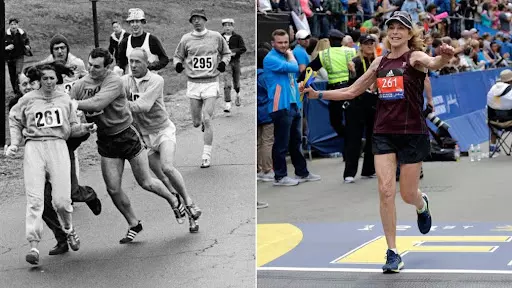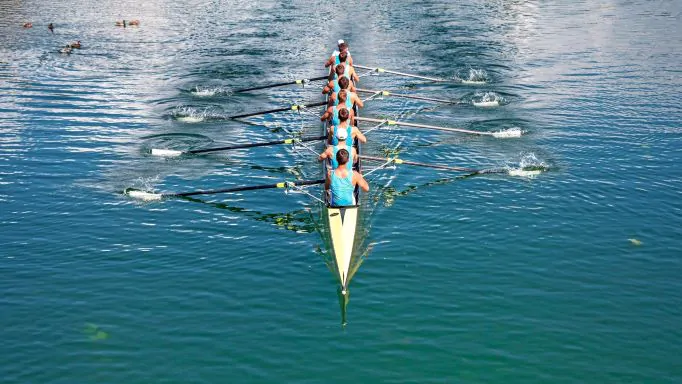For National Girls and Women in Sports Day, we started a weekly series where we publish interviews with astounding women in sports every Wednesday. This week's guest is Kathrine Switzer.
Kathrine Switzer is an inspiring woman, not just to runners, but to women across the world. As the first woman to run the Boston Marathon in 1967, Kathrine has been breaking down barriers for women for the past 52 years. Jock Semple, the co-director of the race, physically attacked her for running as a woman with an official bib: bib #261. Since that moment, Kathrine has been a mogul for women in sports. Kathrine's social activism led to a long partnership with Avon and eventually accomplished the Women's Marathon being included in the Olympic games in 1984.
Kathrine founded a nonprofit – 261 Fearless, Inc. – based on her 1967 bib number, that helps form female running clubs across the world. Today, Kathrine has run 42+ marathons, including Boston nine times, New York city five times (coming in 1st place in 1974 by a 27-minute margin), Berlin in 2011 (the first time it went through both sides of the city), and London in 2018 (to celebrate the 100th anniversary of women getting the right to vote in the UK). Today, Kathrine resides in upstate New York and is the author of numerous books, including Marathon Woman.
Related: Up and Coming Female Athletes You Don't Want to Miss
What inspired you to be the first woman to officially run the marathon, rather than jump in without a bib? What did you hope to achieve by doing so?
My coach, who was not really an official coach, but a volunteer who helped the Syracuse men's XC team, had run the marathon 15 times. When I told him I wanted to do it, we argued a lot, and when I proved to him that I could do it, he said I had to sign up. I couldn't just jump in though, because it was a serious race. To register, I needed my AAU number, a physical, travel documents, it was a whole list.
My coach told me, “Those guys in Boston are really tough bastards, and if you don't follow the rules exactly, they'll be really hard on you.” They were so tough; they had a Dr. at the course examining everyone. The Dr. wouldn't allow even world-class runners to run because their blood pressure was a little too high or something. I was lucky to get in. I signed my name K.V. Switzer. Not to be deceitful, but that's just how I signed my name. The race coordinators probably figured it was a guy and that's probably why I got in.
We [my coach and I] ran 31 miles 2 weeks before the race, and he passed out after the workout. Afterward, he… was my biggest supporter to run Boston. Running the Boston Marathon was a gift. It's the oldest marathon in the world, founded in 1897. I was just running for the joy and thrill to run in what I believed to be the greatest marathon in the world. I was extremely proud to be a woman running it.
Related: How a Good Coach Changed My Life
What is the best piece of advice you've been given from a coach or teammate? Who was the coach?
When I was 12 years old, my dad said I should run a mile a day. Life is to participate, not to spectate. It's not about going fast, it's about finishing. I think my father was throwing down all kinds of advice all along. Today there are shirts with sayings like his, but he said them to me throughout my life.
Related: It Does Not Matter How Slowly You Go
Because there was no women's collegiate or high school team, what inspired you to start running competitively? What advice do you have for student-athletes to stay motivated who may not have extremely structured high school programs, but are looking to compete at a higher level?
From my point of view, the sports part [of Title IX] didn't kick in until 1978. For most girls, there was cheerleading and that was it. I was lucky, my school had field hockey. I was in 8th grade… so I couldn't compete on the team (until 9th grade), but I was running the mile every day to get ready for it. I was lucky enough to have a field hockey team and a basketball team that I got to play on, but so many women elsewhere didn't have the opportunity. The rest of the time… I didn't have anyone to run with, so I ran on my own, and I loved the running.
Related: Dance and Cheer, and the Expectation to Look “Perfect”
I saw running as something I could do in my future. I didn't see sports or potential collegiate scholarships for field hockey and basketball, but I knew I could run. When I became about 17, I began registering for races with the AAU [Amateur Athletic Union], now US Track and Field. I could register for races up to 880m, but most races for women were 200m to 400m. I ran in those, and not very well out of frustration of wanting to run longer distances.
Initially, I went to Lynchburg College, a small school in Virginia, and played Field Hockey and Lacrosse. I ended up running with the men quite by accident. The Cross Country coach needed another person to compete in a race one weekend, so he asked me to run. I ran the race, and came in last of course, but got the team to score. I didn't think much of it, but the media buzzed about a woman running in a men's race.
I then transferred to Syracuse because I wanted to be a sports writer. It was such a male-dominated field, so I knew that to make it in, I needed a really good degree. It was there that I met the coach who would help me run the marathon. I trained with the men's cross country team. And we just ran. After the marathon it became political.
Big universities had no intercollegiate sports for women like Lynchburg. In fact, small schools were doing better for women. How did I stay motivated? I ran with the men's team, then marathons, then zillions of road races. We would all pile in the car and run everything from 10k's to marathons. I remember one year, I ran 10 marathons in one year just to run. It was an amazing collegial companionship. I was of course the only girl. They didn't think of me as a girl though. I was just a teammate. I then founded a track club, the Syracuse, that became the biggest in New York next to the New York road runners, and it was through that that I became more into the social movement. That's when I began my partnership with Avon and started all-female running clubs. We eventually got the women's marathon into the Olympic Games in 1984.
I think post-high school, if someone has the opportunity to run in college then that is motivation enough. The team and your future will motivate you. If you're not good enough to run at the collegiate level or want to focus on academics, then figure out what you want to do: road races, run long distances? Find like-minded people and create your own club.
The toughest is post-collegiate. You run for Oregon, or Syracuse, or Villanova. The question is how do you stay motivated to stay at the world-class level or how do you get there. Then you have to align yourself with a big club. You need to decide what you want to do and go find it. Look at Meb and even Desiree Linden; both aligned themselves with strong clubs in the states until they were ready to compete more seriously. Place yourself geographically where there are teams, coaches, and facilities. The easiest solution to stay motivated is to surround yourself with a community of people that will motivate you.
Related: Rate your Coaches, Facilities and Campus Visits
You trained with men in college. Do you think training with the men impacted your performance? Did you face any adversity from your teammates? If so, what would you say is the best way to overcome a negative team culture?
I never faced any adversity. I gave as good as I got. We were friends. They never diminished me in any way. I wouldn't say that about my first husband though. He always reminded me I was only a woman and wouldn't amount to anything as a runner. Maybe if he hadn't been so critical of me I wouldn't have trained so hard. I'm here and he's not.
You are an avid supporter of the LGBTQ+ community. How would you relate your experience as the first female to run the Boston Marathon to the LGBTQ+ student-athletes competing against adversity at the college-level?
I support anybody who is willing to work hard and try. From that point of view, all of us need to be really open-minded. I think about those guys who welcomed me onto the Syracuse XC team in the fall of 1966. It was astonishing. It wouldn't have happened if I wanted to play football or lacrosse. I think runners have a different mentality.
Sports are always the great equalizer. We don't care about gender or income or age. What we care about is your contribution to the team. We don't even care how fast or slow you are at my age. We just stand there motivating people. We stand as a beacon in sports and in the world of equality and inclusion. It's important to use this as an example for the rest of the world. I think you can be a lot more individualistic in running. With running, once the gun goes off, you're still an individual, and in a way, alone even though you're surrounded by a lot of people.
Related: Texas Transgender Bill: What Do You Think?
If you could go back in time, knowing what you know now, what is one piece of advice you would give yourself when training for the Boston marathon?
It's different at 72 than 25. The one piece of advice I would give myself: Consistency is always more important than anything else. Getting out and doing the work consistently is more important than talent or super-fast races when training for a marathon. When you lose training due to sickness or injury, you need to get back and just get those miles in.
After so many years of long-distance running, you've experienced your share of injuries. With the intensity of college athletics today, many athletes will experience injuries that make competing harder or even remove them from competition. What advice do you have to help these athletes recover mentally and physically?
I'm going through a little injury right now which just happened 2 weeks ago. Why? I don't know? I ran a 5k in Albuquerque. I took a day off and when I went running again my calf tightened up. I stretched and stretched but couldn't get the knot out. I walked back so I wouldn't tear it, and it hasn't gone away. I actually have to get acupuncture tonight. But, I'm losing time. I can't do the Overcliff/Undercliff run tonight and maybe not the Chicago 5k next week.
It's a lot better to take 2 weeks off now instead of 2 months. It's better to be out for 2 months than 2 years. I'm a firm believer in taking care of whatever is right now to save yourself from a more serious injury down the road. You cannot panic. You have to take a deep breath, take your time, and start again when it's time. You're not going to lose too much fitness, so just take the time to get it right. The body can always improve at any age.
Some alternative advice: Do something else. Because I couldn't run this weekend, I got 5 years of paperwork off my study floor. The reason I got Marathon Woman written on time? I had a tear in my retina: “Absolutely no running for 6 weeks. Absolutely not. The retina will tear and you'll go blind,” the ophthalmologist said. So, I finished my book instead. Take your mind off it. Do something that gives you extreme satisfaction.
Related: Athletic Trainer Leah Schoen, on the Most Common College Soccer Injuries
Being that you had a higher purpose with finishing the Boston marathon, what advice can you give athletes on never giving up?
It's really simple. I mean, every time that you give up without cause and lose heart, you have regrets. Every time you keep trying, you know you've tried. One is a negative and one is a positive. There comes a time where maybe you can't run. You need to take the running and make it joyful. Replace it with something else. Think about it and don't give it up until you know you will have no regrets.
What was the first thought that went through your mind after the push from the Boston Marathon co-director? How did that push push you to win?
I was terrified. It was fight or flight. I was trying to get away. He had my shirt. Then my boyfriend decked him, and I was scared he actually got really hurt. There was a split second I wanted to drop out. I was embarrassed. However, if I dropped out, all these people who wanted me to drop out would say, “See she's phony, she's a fake.” That's what everyone was saying back then. “Women are always barging into places they're not supposed to be.” That doesn't make anyone feel good. Almost instantaneous, once I got past the fear I knew I needed to do it.
Can you talk about your relationship with Jock Semple? Many athletes and strong females today face big opponents. Your relationship with Jock Semple changed significantly from your first interaction to even your next Boston Marathon. What caused that change, or inspired the forgiveness? How can others channel this when facing their own nay-sayers?
I had forgiven him for attacking me even during the race in 67. I thought he was just overworked and a product of his time. My issue was women were just ignored. For the next 5 years, when he saw us running, he pretended like we weren't there. When he was ready to accept it, it was like he noticed us for the first time and noticed that we were running and running well. He noticed we loved running as much as he did. He had an awakening, and we became friends. He never said he was sorry, but the kiss in ‘73 was good enough for me. I appreciated what he was trying to do. He was trying to save his race from clowns intervening; it just took time to realize women weren't clowns.
You have to understand he was an angry man for a number of reasons. He had other things going on in his life, and the race was a product of his hard work. We would do speeches together, and I honored him a few times. Forgiveness is very powerful. It doesn't help to berate forever. There's no point in not forgiving because it's a huge burden to carry. You have to be open-minded enough to understand the perspectives of others. How can you not love somebody who has so changed your life and changed women in running. The worst and most negative things in your life can be looked at differently and made positive. Negative things are
For athletes looking towards a big career post-collegiate athletics, how have you turned your career as a runner into one that creates global social change?
I never could make money as a runner. The only money I received was $100 when I was 68 years old. I learned how to organize, and I became a strong activist looking at women everywhere. My career paralleled my activism. I had a voice and visibility. Any time you have the opportunity to be heard, it is up to you to say something important
Title IX requires schools to provide equal access to men and women for opportunities that are being offered if they receive federal funding. What are some pros and cons of Title IX?
Even today, Title IX is a very contentious issue at the college level. People are still resentful thinking that the creation of women's sports is hurting or cutting men's sports. They're upset about having to cut the men's wrestling team for a women's cross country team, but what they don't get is it's all about the funding from the school, and no one is willing to go after the Sacred Cow. Football. You don't really need to carry a roster of 150 men for a football team, especially when so few can go on past college. They're putting blame on the women and no one wants that.
Related: How Title IX Fails Female Athletes
What is your advice to student-athletes reading this?
You probably can do much more than you think you can do. You need to take the next step before you think you can achieve something. Your capacity to achieve is only limited by your willingness to work hard at it. The body will always work hard until it can't. Your mind just constantly needs opening. You've got to do it. You've got to just go out and do it. Put your sneakers on, get out, and do it. Sometimes when you're a really busy person it's easy. You can say to yourself, “I have to go run now or I'm not going to run at all.” You get it done in your morning and you can go about your day knowing you put the work in.
Come back every Wednesday to hear from the next women we feature:
Feb 2: Donna Lopiano
Feb 9: Kaiya McCullough
Feb 16: Kathrine Switzer
Feb 23: Sarah Thomas
March 2: TBA
March 9: Jenny Taft
Have a story idea or know an awesome athlete/coach we should interview? Email us at [email protected]
* Originally published on February 16, 2022, by Grace Regan






